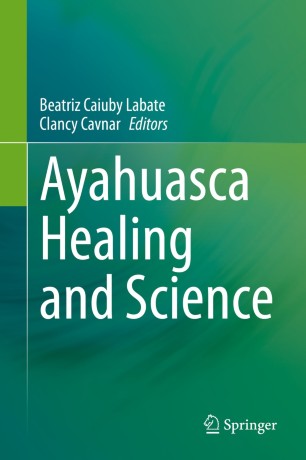Books
Philosophy of Psychedelics
2021 • Chris Letheby
Psilocybin / LSD
LSD — The Wonder Child
2021 • Thomas Hatsis
LSD / Mescaline
Ayahuasca Healing and Science
2021 • Beatriz Caiuby Labate, Clancy Cavnar
DMT / Ayahuasca
Handbook of Medical Hallucinogens
2021 • Charles Grob, Jim Grigsby
Psilocybin / MDMA / Ketamine
Drug Use for Grown-Ups
2021 • Dr. Carl L. Hart
Manual for Psychedelic Guides
2020 • Mark Haden
Listening to Ecstasy
2020 • Charles Wininger
MDMA
The Immortality Key
2020 • Brian C. Muraresku
Psilocybin
The Secret Chief Revealed
2020 • Myron J. Stolaroff
LSD
The Way of the Psychonaut
2019 • Stanislav Grof
LSD
Autism on Acid
2019 • Aaron Paul Orsini
LSD
Consciousness Medicine
2019 • Françoise Bourzat, Kristina Hunter
Psilocybin / LSD / Ayahuasca
How to Change Your Mind
2019 • Michael Pollan
Psilocybin / LSD
Alien Information Theory
2019 • Andrew R. Gallimore
DMT / Tryptamine
Kosmos - A Theory of Psychedelic Experience
2018 • Peter Webster
Getting Higher
2018 • Julian Vayne
Acid Drops
2018 • Andy Roberts
LSD
Magic Medicine
2018 • Cody Johnson
LSD / MDMA / Ketamine / Ayahuasca
The Most Dangerous Man in America
2018 • Bill Minutaglio, Steven L. Davis
LSD
Mystic Chemist
2018 • Dieter A. Hagenbach, Lucius Werthmüller
Psilocybin / LSD / Mescaline
Psychedelic Medicine
2017 • Richard Louis Miller
Psilocybin / LSD / MDMA / Ayahuasca
Neuropsychedelia
2017 • Nicolas Langlitz
LSD
The Psychedelic Experience
2017 • Ralph Metzner, Ram Dass, Timothy Leary
LSD
Sacred Knowledge
2015 • William A. Richards
Noumenautics
2015 • Peter Sjösted-H
LSD
To Fathom Hell Or Soar Angelic
2015 • Ben Sessa
Therapy with Substance
2015 • Friederike Meckel Fischer
Xenolinguistics
2015 • Diana Slattery
Psilocybin / LSD / Ayahuasca
Ayahuasca, Ritual and Religion in Brazil
2014 • Beatriz Caiuby Labate, Edward MacRae
Ayahuasca
Manifesting Minds
2014 • Rick Doblin, Brad Burge, Albert Hoffman, Ram Dass, Sasha Shulgin
Psilocybin / LSD / MDMA / Ibogaine / Ayahuasca
The Therapeutic Use of Ayahuasca
2013 • Beatriz Caiuby Labate, Clancy Cavnar
Ayahuasca
The Healing Journey
2013 • Claudio Naranjo
MDMA / Ibogaine / Ayahuasca











